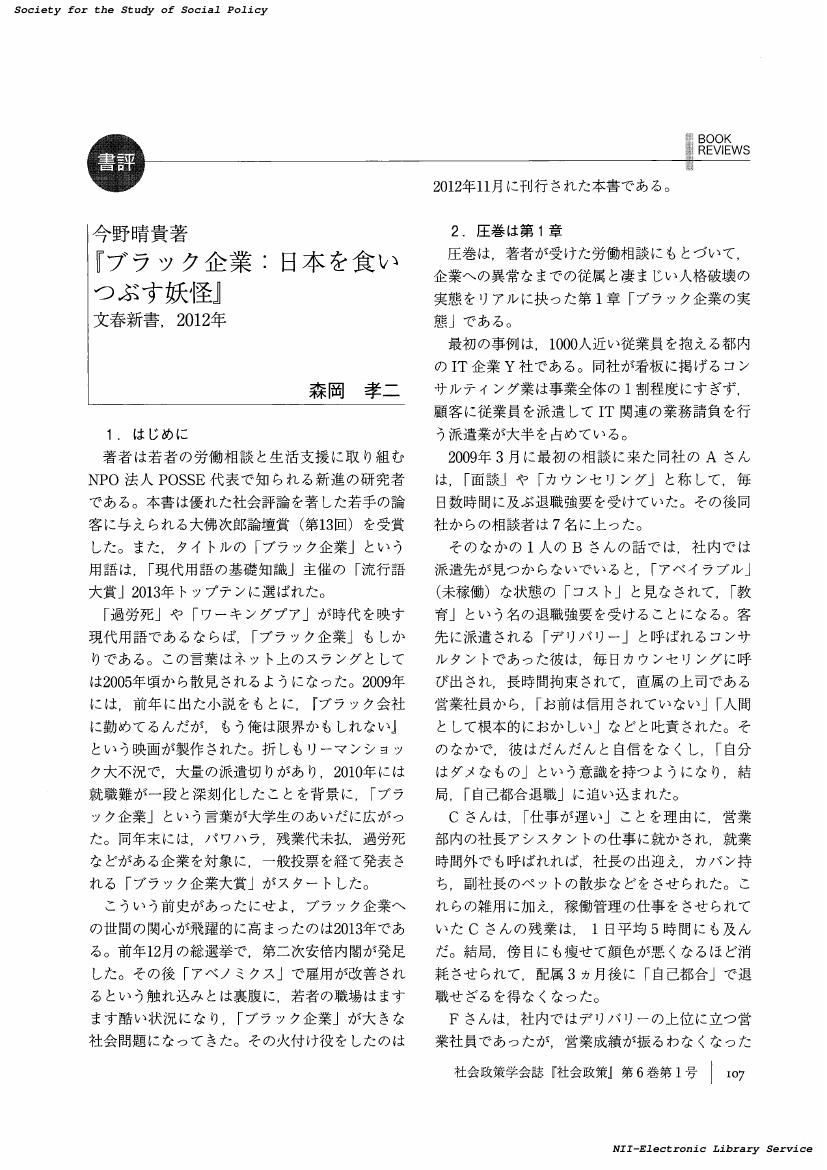7 0 0 0 OA Ⅶ 労働時間のコンプライアンス実態とサービス残業
- 著者
- 森岡 孝二
- 出版者
- 関西大学経済・政治研究所
- 雑誌
- ビジネス・エシックスの新展開
- 巻号頁・発行日
- pp.171-220, 2008-03-31
4 0 0 0 OA 『資本論』と現代の労働--いまマルクスの労働時間論をどう読むか
- 著者
- 森岡 孝二
- 出版者
- 経済理論学会
- 雑誌
- 季刊経済理論 (ISSN:18825184)
- 巻号頁・発行日
- vol.53, no.4, pp.18, 2017 (Released:2019-01-07)
3 0 0 0 OA アメリカの労働時間論争と働きすぎの実態(経済学部創設100周年記念特輯)
- 著者
- 森岡 孝二
- 出版者
- 関西大学
- 雑誌
- 關西大學經済論集 (ISSN:04497554)
- 巻号頁・発行日
- vol.54, no.3, pp.521-544, 2004-11-11
1980年代以降、19世紀後半から1世紀余り続いた労働時間の短縮の時代が終わり、世界的に労働時間の増加が生じている。アメリカではJ.B.ショアが『働きすぎのアメリカ人』(1991年)において包括的な統計分析を踏まえて、働きすぎの時代が到来したことをいち早く明らかにした。その後、ショアの提起は経済学や社会学における労働時間論議に火をつけ、労働統計や生活時間研究の専門家を巻き込んだ論争を引き起こした。本稿では、ショアの問題提起に始まるアメリカにおける労働時間論争を跡づけ、日本との対比に留意して、アメリカ人の働きすぎの実態とその主要な原因について検討する。その作業からアメリカにおける労働時間の増大は、長時間労働者と短時間労働者への二極分化、女性における職場と家庭のタイム・デバイド、働きすぎと浪費の悪循環などの特徴をもっていることが浮かび上がるだろう。
- 著者
- 森岡 孝二
- 出版者
- 経済理論学会
- 雑誌
- 季刊経済理論 (ISSN:18825184)
- 巻号頁・発行日
- vol.42, no.1, pp.22-33, 2005-04-20 (Released:2017-04-25)
This paper discusses the transformation of employment relations inspired by market individualism and major structural changes in contemporary capitalism. Recent decades in Japan, the USA, and other countries have witnessed the rapid growth of contingent employment. Workers have become polarized into those who work shorter and longer hours. At the same time, average annual working hours have risen, reversing what had been a trend toward long-term decline. Behind these trends are the deregulation of the labor market and market individualism, which treat employees as if they were independent craft workers, and leads to calls for the diversification of employment patterns and individualization of working hours. Four elements of "new economy" capitalism are the source of this transformation. First, the process of globalization has caused intensified competition, forcing the restructuring of production methods and work organization, leading to deteriorating working conditions in the home countries of multinational corporations. Second, advances in information and communication technologies have promoted the outsourcing of business operations and the replacement of full-time employees by part-time and temporary workers. Moreover, the information revolution in offices has given rise to a "24-hour economy," with matching job stress that erodes the private sphere of workers' lives. Third, today's consumer society and the accompanying feminization of the labor force have produced overconsumption driven by a spirit of emulation and unlimited desires, resulting in what Juliet Schor called "the cycle of work and spend." Consumers' pursuit of convenience and low prices has brought employment instability and longer working hours. Fourth, recent management style changes that make stock price performance the highest priority have encouraged downsizing and layoffs. Employees accepted these unpleasant outcomes without much resistance as long as they held stocks, especially when stock prices continued to increase in the 1990s in the USA. The paper concludes that there is an integral relationship between market individualism in worlds of work and structural changes in contemporary capitalism. Driven by developments in information and communication technologies, globalization spreads employment instability and longer working hours by encouraging competition for advantage among consumers and investors. However, contrary to what market individualists think, in this age we need labor policies that place emphasis on workers' common interests and trade unions that represent workers collectively.
1 0 0 0 OA 今野晴貴著, 『ブラック企業 : 日本を食いつぶす妖怪』, 文春新書, 2012年
- 著者
- 森岡 孝二
- 出版者
- 社会政策学会
- 雑誌
- 社会政策 (ISSN:18831850)
- 巻号頁・発行日
- vol.6, no.1, pp.107-109, 2014-09-10 (Released:2018-02-01)
- 被引用文献数
- 1
1 0 0 0 OA 保住敏彦『ドイツ社会主義の政治経済思想』, 法律文化社, 1993, 8+7+272p.
- 著者
- 森岡 孝二 保住 敏彦
- 出版者
- 経済学史学会
- 雑誌
- 経済学史学会年報 (ISSN:04534786)
- 巻号頁・発行日
- vol.32, no.32, pp.162-163, 1994 (Released:2010-08-05)
1 0 0 0 OA アメリカの労働時間論争と働きすぎの実態
- 著者
- 森岡 孝二
- 出版者
- 關西大学經済學會
- 雑誌
- 關西大學經済論集 (ISSN:04497554)
- 巻号頁・発行日
- vol.54, no.3-4, pp.521-544, 2004-11-11
1980年代以降、19世紀後半から1世紀余り続いた労働時間の短縮の時代が終わり、世界的に労働時間の増加が生じている。アメリカではJ.B.ショアが『働きすぎのアメリカ人』(1991年)において包括的な統計分析を踏まえて、働きすぎの時代が到来したことをいち早く明らかにした。その後、ショアの提起は経済学や社会学における労働時間論議に火をつけ、労働統計や生活時間研究の専門家を巻き込んだ論争を引き起こした。本稿では、ショアの問題提起に始まるアメリカにおける労働時間論争を跡づけ、日本との対比に留意して、アメリカ人の働きすぎの実態とその主要な原因について検討する。その作業からアメリカにおける労働時間の増大は、長時間労働者と短時間労働者への二極分化、女性における職場と家庭のタイム・デバイド、働きすぎと浪費の悪循環などの特徴をもっていることが浮かび上がるだろう。
1 0 0 0 独占資本主義の解明 : 予備的研究
- 著者
- 森岡 孝二
- 出版者
- 民主法律協会
- 雑誌
- 民主法律 (ISSN:03885798)
- 巻号頁・発行日
- no.305, pp.67-69, 2018-02
1 0 0 0 OA Ⅶ 労働時間のコンプライアンス実態とサービス残業
- 著者
- 森岡 孝二
- 出版者
- 関西大学経済・政治研究所
- 雑誌
- ビジネス・エシックスの新展開
- 巻号頁・発行日
- pp.171-220, 2008-03-31
1 0 0 0 政治献金を元から絶つ--生保契約者による集団訴訟
1 0 0 0 株主資本主義と派遣切り
- 著者
- 森岡 孝二
- 出版者
- 新日本出版社
- 雑誌
- 経済 (ISSN:04534670)
- 巻号頁・発行日
- no.166, pp.12-26, 2009-07



